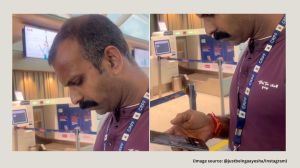Anti-terror terminology: ‘Jihadist’ out, ‘violent extremist’ in
The Bush administration has launched a new front in the campaign against terrorism, this time targeting language.

Do not call them jihadists any more. Also, do not call al-Qaida a movement.
The Bush administration has launched a new front in the campaign against terrorism, this time targeting language.
Federal agencies, including the State Department, the Homeland Security Department and the National Counterterrorism Center, are telling their people not to describe Islamic extremists as “jihadists” or “mujahedeen,” according to documents obtained by The Associated Press. Such verbiage as “Islamo-fascism” is out, too.
The reason such words may actually boost support for radicals among Arab and Muslim audiences by giving them a veneer of religious credibility or by causing offence to moderates.
For example, while Americans may understand “jihad” to mean “holy war,” it is in fact a broader Islamic concept of the struggle to do good, says the guidance prepared for diplomats and other officials tasked with explaining the anti-terror campaign to the public. Similarly, “mujahedeen,” which means those engaged in jihad, must be seen in its broader context.
US officials may be “unintentionally portraying terrorists, who lack moral and religious legitimacy, as brave fighters, legitimate soldiers or spokesmen for ordinary Muslims,” says a Homeland Security report. It is titled Terminology to Define the Terrorists Recommendations from American Muslims.
“Regarding jihad, even if it is accurate to reference the term, it may not be strategic because it glamorizes terrorism, imbues terrorists with religious authority they do not have and damages relations with Muslims around the world,” the report says.
Language is critical in fighting terror, says another document, an internal “official use only” memorandum circulating through Washington titled Words that Work and Words that Don’t: A Guide for Counterterrorism Communication.”
The memo, originally prepared in March by the Extremist Messaging Branch at the National Counterterrorism Center, was approved for diplomatic use this week by the State Department, which plans to distribute a version to all US embassies, officials said.
“It’s not what you say, but what they hear,” the memo says in bold italic lettering, listing 14 points about how better to present the anti-terror campaign.
“Don’t take the bait,” it says, urging officials not to react when Osama bin Laden or al-Qaida affiliates speak. “We should offer only minimal, if any, response to their messages. When we respond loudly, we raise their prestige in the Muslim world.”
“Don’t compromise our credibility” by using words and phrases that may ascribe benign motives to terrorists.
Some other specifics: “Never use the terms ‘jihadist’ or ‘mujahedeen’ in conversation to describe the terrorists. Calling our enemies ‘jihadis’ and their movement a global ‘jihad’ unintentionally legitimizes their actions.”
“Use the terms ‘violent extremist’ or ‘terrorist.’ Both are widely understood terms that define our enemies appropriately and simultaneously deny them any level of legitimacy.”
On the other hand, avoid ill-defined and offensive terminology “We are communicating with, not confronting, our audiences. Don’t insult or confuse them with pejorative terms such as ‘Islamo-fascism,’ which are considered offensive by many Muslims.”


- 01
- 02
- 03
- 04
- 05





























